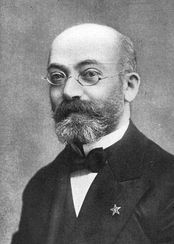Speak to the World!
Esperanto is a language with fascinating structure, regularity and richness. It gives you unequalled possibilities to travel anywhere in the world at low cost and "high satisfaction", allows you to connect with people of similar interests, wherever they may be and opens doors of solidarity world-wide.
In short, with Esperanto you can truly speak to the world.
In short, with Esperanto you can truly speak to the world.
What is Esperanto?
A unique language
Apart from not belonging to any ethnic group Esperanto is not like other languages:
- It is easier to learn
- It is logical and streamlined in word-building, plurals, and pronunciation
And where does it come from?
 Dr. L.L. Zamenhof
Dr. L.L. Zamenhof
The first publication in Esperanto was in 1887, when Dr. L.L. Zamenhof proposed it as a language to the world. His idea was that a common, second language would contribute to a better understanding between ethnic groups and nations.
After spreading mainly in Europe during the 20th century, the language has developed greatly in China, Brazil, Iran, and other countries. In 1990, the number of speakers globally was estimated at more than 2 million(1) in more than 100 countries.
(1)Source: World Almanac and Book of Facts, 1990, New York
After spreading mainly in Europe during the 20th century, the language has developed greatly in China, Brazil, Iran, and other countries. In 1990, the number of speakers globally was estimated at more than 2 million(1) in more than 100 countries.
(1)Source: World Almanac and Book of Facts, 1990, New York
What is Esperanto for?
To meet people
Esperanto is, in the first place, a means to encounter:
Esperanto gives you:
- foreign people abroad (by attending congresses or using the free world-wide accommodation service)
- the world from home (you can provide accommodation for travellers or just correspond)
- your own neighbours from other linguistic backgrounds
Esperanto gives you:
- Access to a variety of cross-cultural, original or translated literature, music and other media
- A better understanding of your own and other languages
To experience solidarity
 Bernard Runyerera Londoni
Bernard Runyerera Londoni
Says Bernard Londoni Runyerera:
Esperanto, as a neutral language, is a language of respect and solidarity. Esperanto-speakers of various countries have often helped me through difficult times.
There are many examples of initiatives which gained financial and moral support, e.g. a solar energy project in Tanzania, a school in Madagascar, and a refugee support organisation in Durban.
Esperanto, as a neutral language, is a language of respect and solidarity. Esperanto-speakers of various countries have often helped me through difficult times.
There are many examples of initiatives which gained financial and moral support, e.g. a solar energy project in Tanzania, a school in Madagascar, and a refugee support organisation in Durban.
And what is happening in Africa?
In Africa too, Esperanto is spreading, with associations in thirteen countries(2), four African Congresses held since 1990, a great variety of translated or original African literature, and a number of international development/support initiatives.
As a neutral, non-colonial language, Esperanto is obviously a more acceptable basis for inter-ethnic communication than are the languages currently used as "lingua franca".
It is also a means of connecting Africa to the rest of the world and for everyone to benefit from international solidarity.
(2)Algeria, Benin, Cameroon, DRC, Egypt, Ghana, Ivory Coast, Madagascar, South AFrica, Tanzania, Togo, Tunisia, Zimbabwe
As a neutral, non-colonial language, Esperanto is obviously a more acceptable basis for inter-ethnic communication than are the languages currently used as "lingua franca".
It is also a means of connecting Africa to the rest of the world and for everyone to benefit from international solidarity.
(2)Algeria, Benin, Cameroon, DRC, Egypt, Ghana, Ivory Coast, Madagascar, South AFrica, Tanzania, Togo, Tunisia, Zimbabwe
